Daily Vocabulary Words: List of Daily Used Words in Leading International Newspapers
Hi there. Welcome to this special section @ Wordpandit.
Our endeavour here is very simple: to highlight important daily vocabulary words, which you would come across in leading newspapers in the country. We have included the following newspapers in our selection:
• The New York Times
• The Washington Post
• Scientific American
• BBC
• The Guardian
• Psychology Today
• Wall Street Journal
• The Economist
We are putting in extensive work for developing your vocabulary. All you have got to do is be regular with this section and check out this post on a daily basis. This is your repository of words that are commonly used and essentially, we are posting a list of daily used words. Hence, this has significant practical application as it teaches you words that are used commonly in leading publications mentioned above.
Visit the website daily to learn words from leading international newspapers.
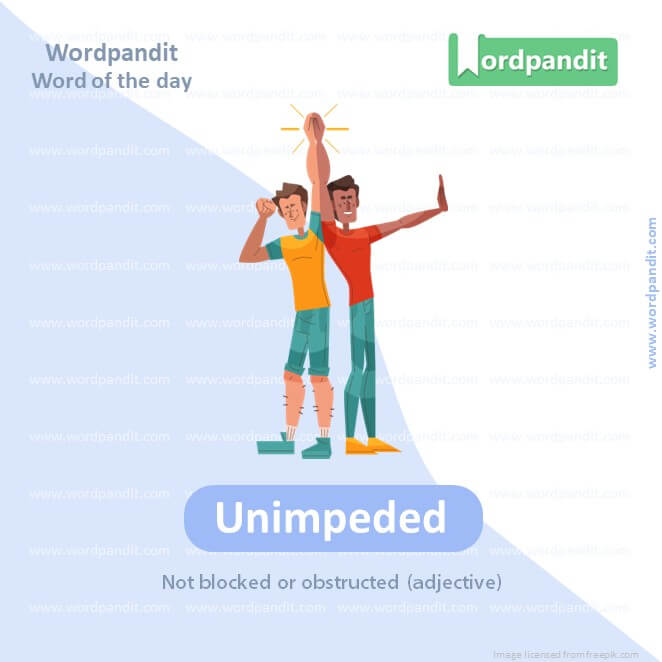
WORD-1: Unimpeded
CONTEXT: we demand unimpeded humanitarian access in line with international law.
SOURCE: Washington Post
EXPLANATORY PARAGRAPH: Imagine you’re running in a big, open field with no trees, no stones, and no obstacles in your way. You can run straight without stopping or turning. That’s what “unimpeded” means – nothing blocking your way.
MEANING: Not blocked or obstructed (adjective).
PRONUNCIATION: un-im-PEE-ded
SYNONYMS: Unobstructed, unhindered, clear, free, open, unrestricted, unblocked.
USAGE EXAMPLES:
1. The river flows unimpeded through the valley.
2. She completed her task unimpeded by distractions.
3. The open road allowed unimpeded travel.
4. With the path clear, the team’s progress was unimpeded.
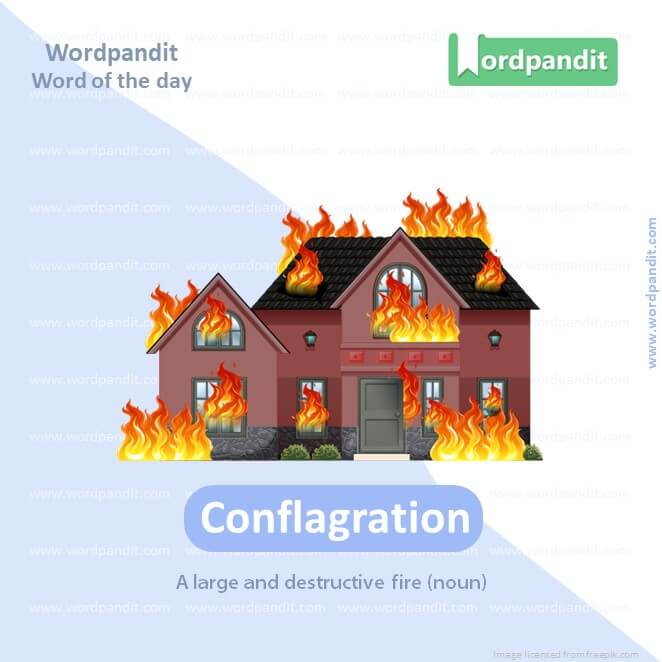
WORD-2: Conflagration
CONTEXT: an all-out conflagration in the region and beyond — something that would ultimately run contrary to U.S. interests.
SOURCE: Guardian
EXPLANATORY PARAGRAPH: Imagine a really big fire, bigger than a campfire, where lots of things are burning at once. That big fire is called a “conflagration.”
MEANING: A large and destructive fire (noun).
PRONUNCIATION: kon-fluh-GRAY-shun
SYNONYMS: Blaze, inferno, firestorm, holocaust, wildfire, bonfire, flames.
USAGE EXAMPLES:
1. The conflagration consumed the entire forest.
2. Firefighters battled the conflagration for hours.
3. The town was destroyed by a sudden conflagration.
4. Smoke from the conflagration could be seen miles away.
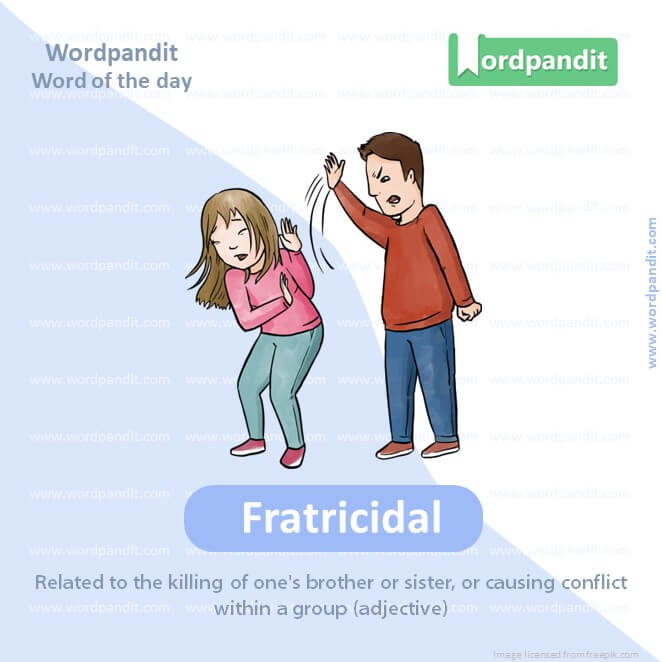
WORD-3: Fratricidal
CONTEXT: Subsequent elections have been repeatedly canceled amid the fratricidal tensions and bouts of conflict among Palestinian factions, as well as periodic wars with the Israelis.
SOURCE: Guardian
EXPLANATORY PARAGRAPH: Imagine two brothers fighting with each other, but it’s more than just a small fight – it’s really bad and hurtful. When something is like that, it’s “fratricidal.”
MEANING: Related to the killing of one’s brother or sister, or causing conflict within a group (adjective).
PRONUNCIATION: frat-ri-SY-dal
SYNONYMS: Brother-killing, deadly, hostile, divisive, conflict-ridden, internal feud, sibling rivalry.
USAGE EXAMPLES:
1. The fratricidal war divided the nation.
2. Historical tales often speak of fratricidal battles among royals.
3. The fratricidal dispute shattered their once close bond.
4. The community was torn apart by fratricidal conflicts.
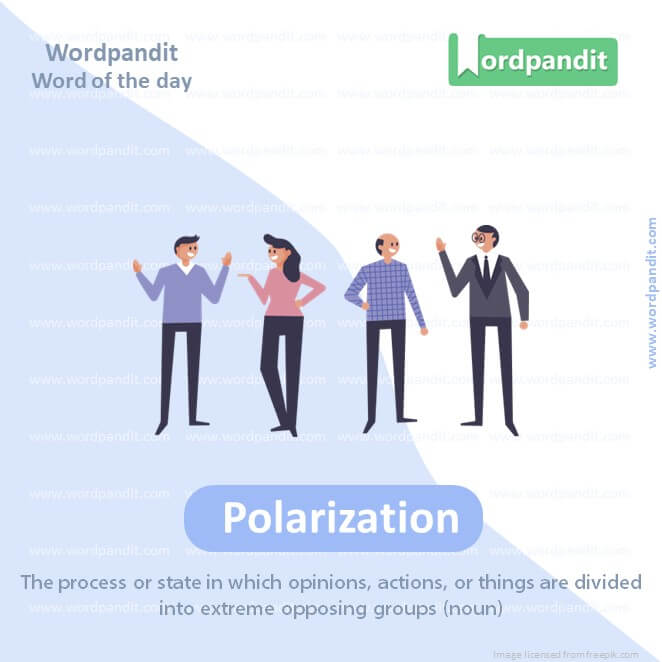
WORD-4: Polarization
CONTEXT: a winner-take-all method can result in lopsided outcomes that result in upset losers and further polarization.
SOURCE: Al Jazeera
EXPLANATORY PARAGRAPH: Imagine you have two magnets. One side pulls towards the other because they’re different, like a north pole and a south pole. But when things or people are pulled apart because of big differences, we call that “polarization.”
MEANING: The process or state in which opinions, actions, or things are divided into extreme opposing groups (noun).
PRONUNCIATION: poh-luh-ri-ZAY-shun
SYNONYMS: Division, separation, divergence, split, dichotomy, schism, rift.
USAGE EXAMPLES:
1. The debate led to polarization among the community.
2. Polarization in politics has become more evident.
3. The issue caused increased polarization between the two groups.
4. Social media is often blamed for contributing to societal polarization.
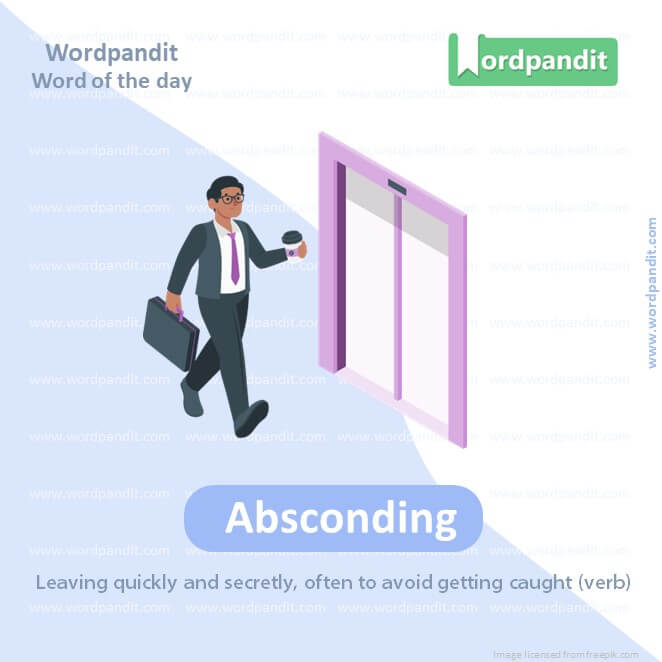
WORD-5: Absconding
CONTEXT: absconding with aid intended for civilians and using civilians as human shields, a war crime.
SOURCE: Guardian
EXPLANATORY PARAGRAPH: Imagine you have a toy, and you quietly take it and hide it without anyone seeing you. That’s a little like “absconding,” which means to sneak away and hide.
MEANING: Leaving quickly and secretly, often to avoid getting caught (verb).
PRONUNCIATION: ab-SKOND-ing
SYNONYMS: Fleeing, eloping, escaping, running away, vanishing, disappearing, bolting.
USAGE EXAMPLES:
1. He was charged with absconding with company funds.
2. She absconded from her home in the middle of the night.
3. The thief absconded with the stolen jewels.
4. Many are searching for the criminal who is absconding.
WORD-6: Concessions
CONTEXT: Arafat and Abbas to make substantial concessions that would lead to a peace agreement with Israel.
SOURCE: Al Jazeera
EXPLANATORY PARAGRAPH: Imagine you want two candies, but your friend wants one of them. So, you give one candy to your friend, and you keep one for yourself. That act of giving something or agreeing to something to make someone else happy is called a “concession.”
MEANING: Things that are given up or reduced, often to reach an agreement (noun).
PRONUNCIATION: kuhn-SESH-unz
SYNONYMS: Compromises, allowances, adjustments, grants, give-ins, accommodations, considerations.
USAGE EXAMPLES:
1. The workers were granted several concessions after the strike.
2. He made several concessions to secure the deal.
3. The concessions stand at the movie theater was crowded.
4. Management and employees reached an agreement after several concessions.
WORD-7: Appallingly
CONTEXT: Though in explaining that appallingly high figure, here too Hamas offered some assistance.
SOURCE: Guardian
EXPLANATORY PARAGRAPH: Imagine seeing something that makes you go, “Eww!” or “Oh no!” because it’s really bad or scary. When something is like that, you can say it’s “appallingly” bad.
MEANING: To a shocking or horrifying extent (adverb).
PRONUNCIATION: uh-PAWL-ing-ly
SYNONYMS: Horrifyingly, shockingly, terribly, awfully, dreadfully, frightfully, ghastlily.
USAGE EXAMPLES:
1. The room was appallingly dirty.
2. The movie was appallingly bad.
3. She treated him appallingly throughout their relationship.
4. The conditions in the camp were appallingly poor.
WORD-8: Maximalists
CONTEXT: we’ll see that the contest that matters most is the battle of hardliners v moderates, or, to be more specific, maximalists v partitionists.
SOURCE: Al Jazeera
EXPLANATORY PARAGRAPH: Imagine someone who always wants the biggest and the most of everything! Instead of one ice cream scoop, they want ten. They don’t want something small; they want it at its maximum. Those people are called “maximalists.”
MEANING: People who advocate for complete or extreme measures, or favor excessive things (noun).
PRONUNCIATION: max-ih-MUH-lists
SYNONYMS: Extremists, radicals, zealots, hardliners, purists, diehards, ultraists.
USAGE EXAMPLES:
1. The maximalists demanded all or nothing in the negotiations.
2. Her home, decorated by maximalists, was filled with colorful items.
3. Maximalists often have a “more is more” philosophy.
4. In the fashion world, maximalists are known for their bold styles.
WORD-9: Countenance
CONTEXT: There is no way that the authority would even countenance such a plan unless it was a transition to genuine Palestinian statehood.
SOURCE: Al Jazeera
EXPLANATORY PARAGRAPH: Imagine looking at someone’s face to see if they’re happy, sad, or angry. Their face shows their feelings. This face or expression is called “countenance.” It can also mean to allow or accept something.
MEANING:
1. A person’s face or facial expression (noun).
2. To accept, support, or approve of something (verb).
PRONUNCIATION: KOWN-teh-nans
SYNONYMS:
1. Expression, visage, demeanor, mug, look, appearance.
2. Approve, tolerate, permit, allow, endorse.
USAGE EXAMPLES:
1. His countenance revealed his true feelings.
2. The teacher’s stern countenance silenced the class.
3. I cannot countenance such rude behavior.
4. The company won’t countenance any breaches of protocol.
WORD-10: Extremists
CONTEXT: the same ally they’ve always had: the extremists on the other side.
SOURCE: Washington Post
EXPLANATORY PARAGRAPH: Imagine some people who believe in something very, very strongly, and they’re willing to do big things because of that belief. They’re not in the middle; they’re at the far ends. These people are called “extremists.”
MEANING: People who have extreme views or actions, especially in political or religious contexts (noun).
PRONUNCIATION: ik-STREE-mists
SYNONYMS: Radicals, fanatics, zealots, hardliners, ultras, militants, fundamentalists.
USAGE EXAMPLES:
1. The government is taking measures to counter the rise of extremists.
2. Extremists on both sides of the debate refused to compromise.
3. The city witnessed a protest led by religious extremists.
4. The group of extremists was arrested for planning an attack.
Vocabulary Spelling
In the rich tapestry of language learning, getting the ‘vocabulary spelling’ right forms a significant thread. These spelled words or the arrangement of letters give each word its unique identity. However, understanding ‘vocabulary spelling’ proficiently needs an insightful and strategic approach.
Starting the journey of learning ‘vocabulary spelling’, one must focus on observing patterns. English language words often follow certain spelling rules or patterns. Recognizing these can simplify the learning process, offering a systematic way to appreciate ‘vocabulary spelling’.
The trick to ingraining ‘vocabulary spelling’ effectively lies in the power of repetition. Regularly writing words can help reinforce the spelling in your memory. To boost this, tools like spelling quizzes or flashcards with the word on one side and the spelling on the other can provide an engaging way to practice ‘vocabulary spelling’.
An unconventional yet powerful approach to remember ‘vocabulary spelling’ is by using mnemonic devices. For instance, connecting the word’s spelling with a catchy phrase or rhyming pattern can make recall easier.
Integrating technology with learning ‘vocabulary spelling’ has its unique benefits, too. Apps offer various exercises and tests that not only enhance memory but also make learning fun.
Importantly, the learning of ‘vocabulary spelling’ should be punctuated with regular revisions. This ensures the recalled spelling is correct and cements it in your long-term memory.
In a nutshell, mastering ‘vocabulary spelling’ requires keen observation, regular practice, innovative mnemonic tools, use of technology, and timely revisions. As you follow this comprehensive path, you strengthen your grasp over ‘vocabulary spelling’, paving the way to language proficiency. Remember, every word spelled correctly is a moment of triumph in the enthralling escapade of language learning!







